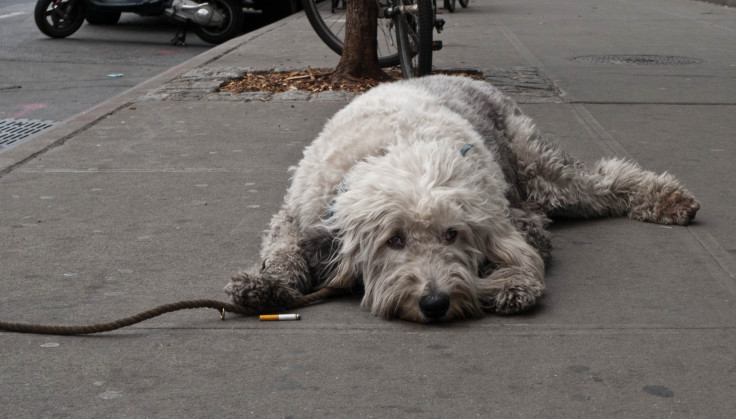Secondhand Smoke’s Impact On Your Furry Friends’ Health: Pets May Be At Higher Risk Than Kids

Secondhand smoke harms both children and adults alike — but what about pets? Researchers from the University of Glasgow in the UK set out to investigate the effect tobacco smoke’s 7,000 chemicals had on dogs and cats. The study, which is ongoing, reveals just how much pet owners put their furry friends at risk when they light up.
Researchers measured the nicotine levels in both cat and dog fur; and then assessed castrated dog testicles to scan for signs of cells damage. Not only did they find that dogs gained more weight when they lived in smoking households, but they also identified a gene that indicates cancerous cell damage. As for cats, researchers found indoor and outdoor cats ingested more smoke than dogs, possibly because cats groom themselves more often than dogs. This leads them to ingest more of the tobacco toxins that get trapped in their fur.
Compared to cats and dogs living in non-smoking households, researchers believe animals exposed to secondhand smoke are at greater risk for weight gain, cell damage, and certain types of cancer.
According to the Centers for Disease Control and Prevention (CDC), the only way to protect exposed nonsmokers is to eliminate smoking in all homes, worksites, vehicles, and public places. Separating smokers from nonsmokers, opening windows, or using air filters won't prevent surrounding persons from breathing in secondhand smoke, the CDC said. Since 1964, approximately 2.5 million nonsmokers have died from health problems caused by secondhand smoke exposure.
Researchers found, too, that pet owners who reduced the number of cigarettes they smoked a day to 10 also reduced the level of harm to their pet; however, it did not eliminate it completely. Because cats and dogs are lower in height, thus closer to the carpets or furniture smoke becomes trapped in, pets may be at an ever greater risk of health problems than children.
In a 2013 study, researchers found cigarette smoke could be harmful to pets' lungs just as much as an infant or child. Veterinarians have reported incidences where an owner quits smoking and their pet's lung problems or disease improves.
Humans routinely (at least most of them) shower and wash their hands, which helps remove the harmful chemicals they're exposed to on a regular basis. Animals, on the other hand, often go much longer without a bath, allowing the harmful chemicals to cling to their fur and skin for longer.
"Pet owners often do not think about the impact that smoking could have on their pets," said the study's co-author Clare Knottenbelt, a professor of animal medicine and oncology at the University of Glasgow, in a press release. "Whilst you can reduce the amount of smoke your pet is exposed to by smoking outdoors and by reducing the number of tobacco products smoked by the members of the household, stopping smoking completely is the best option for your pet's future health and well-being."
Source: University of Glasgow. 2016.



























